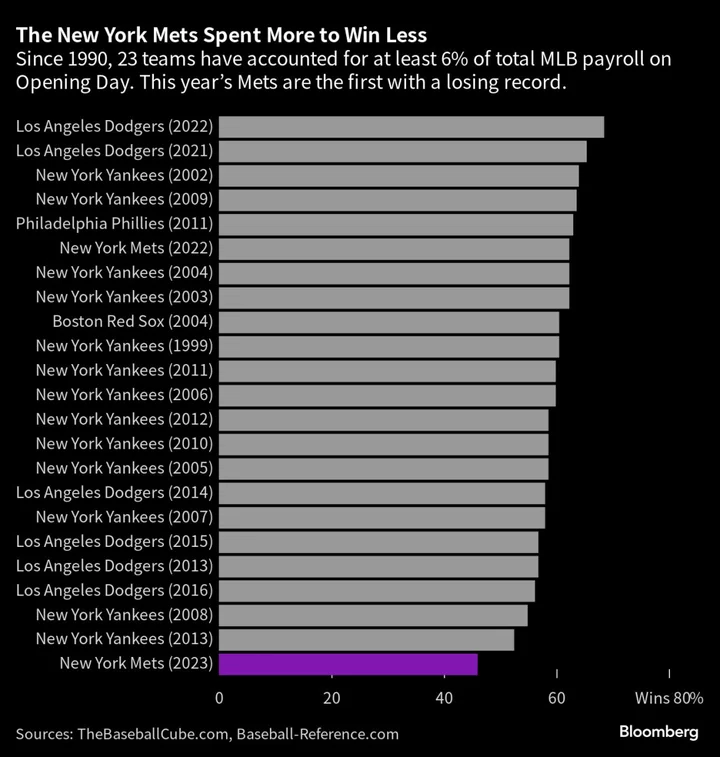The 2023 Major League Baseball regular season marks the 20th anniversary of the publication of Moneyball, Michael Lewis’ landmark book on how the Oakland Athletics used statistical analysis to build a winning team on the cheap.
The milestone comes at a bitter moment for fans in Oakland, as owner John Fisher appears intent on moving the team to Las Vegas. The A’s still spend less than their rivals, with the lowest Opening Day payroll in the league this season at just below $57 million, but the results are no longer surprising: Oakland finished the season this weekend with baseball’s worst record, with 50 wins and 112 losses. The Hollywood underdogs have become cellar dwellers.
Yet there is a storybook, small-market franchise wildly outperforming expectations. It just happens to play on another bay about 2,500 miles east of Oakland. The Baltimore Orioles, who spent less in 2023 than every team except for the A’s, finished on top of the American League East with 101 wins. They did it with young talent — including standouts like shortstop Gunnar Henderson, catcher Adley Rutschman and starting pitcher Kyle Bradish — who are earning close to the league minimum of $720,000.
Since 1990, no team has spent less as a share of total league payroll and had a better record.
Nipping at their heels in the division were the Tampa Bay Rays, the third-lowest spending team in baseball, who have proven that they can compete year after year on a meager budget. Both teams secured a berth in the playoffs, which got underway on Tuesday.
The three biggest spenders in the game, meanwhile, each fell short, with the New York Mets, New York Yankees and San Diego Padres all failing to make the postseason. The Mets, in particular, are an historic flop. With an all-time high Opening Day payroll of more than $330 million (not including about $100 million in luxury-tax penalties), billionaire owner Steve Cohen’s team finished 74-87.
Since 1990, no other team has spent more as a share of total league payroll and finished with a losing record. The Mets are now retrenching for next year, bringing in former Milwaukee Brewers executive David Stearns to be the club’s president of baseball operations.
Overall, the Moneyball premise of doing more with less has fared well this season. There are, to be sure, still big spenders finding success: Of the 10 teams with highest Opening Day payrolls, six made the playoffs. But the correlation between payroll spending and wins is the weakest it’s been in more than three decades.
According to sports economists, this season is probably an aberration. The Orioles and Mets are extreme examples — on opposite ends of the spectrum — of the fundamental uncertainty in the game.
“Having a bigger budget provides a competitive advantage, but success in baseball isn't a product of fiscal determinism,” said JC Bradbury at Kennesaw State University.
The relationship between payroll and wins, according to David Berri of Southern Utah University, who has run the numbers for his Sports Economics textbook, has been fairly constant over the last four decades, with payroll explaining 16% of the variation in wins. That leaves a lot of room for other factors, from managerial acumen to dumb luck.
This year’s rule changes, according to Vince Gennaro at the NYU Preston Robert Tisch Institute for Global Sport, might also have played a small part. Pitch clocks, bigger bases and limits on how often a pitcher can step off the mound all tilt the advantage toward baserunners, giving an extra edge to teams with speedy young players.
“Some teams got whipsawed by the new rules and have not adjusted how they built their organization,” said Gennaro.
While the new rules may have had an impact at the margins, the simplest explanation is that the Orioles hit the prospect jackpot and the Mets — who can afford to make mistakes under Cohen’s ownership — missed badly in free agency.
The labor market in baseball is divided into two basic categories: Players in their first six years whose wages are controlled by a salary scale; and players with at least six years of experience who are free to sell their services to the highest bidder. Small-market teams tend to shop mostly in the first, while big-market teams rely more on the second. Both come with uncertainty. With prospects, it’s hard to know how they will perform at the highest level. With free agents, it’s hard to know how they will decline.
“If you have the money, it's probably better to bet on people who've already done this at some point,” said Berri, “But you don't have to do it that way. You could just bet on prospects.”
For both the Orioles and Mets, there’s also been an element of luck. Baseball statisticians look at how many games a team would be expected to win, based on their total runs scored and allowed over a season, and how many they actually won. By this measure of luck, according to Baseball Reference, the Orioles finished with seven more wins than expected.
The Mets were unlucky, with five fewer.
Author: Ira Boudway, David Ingold and Mathieu Benhamou

